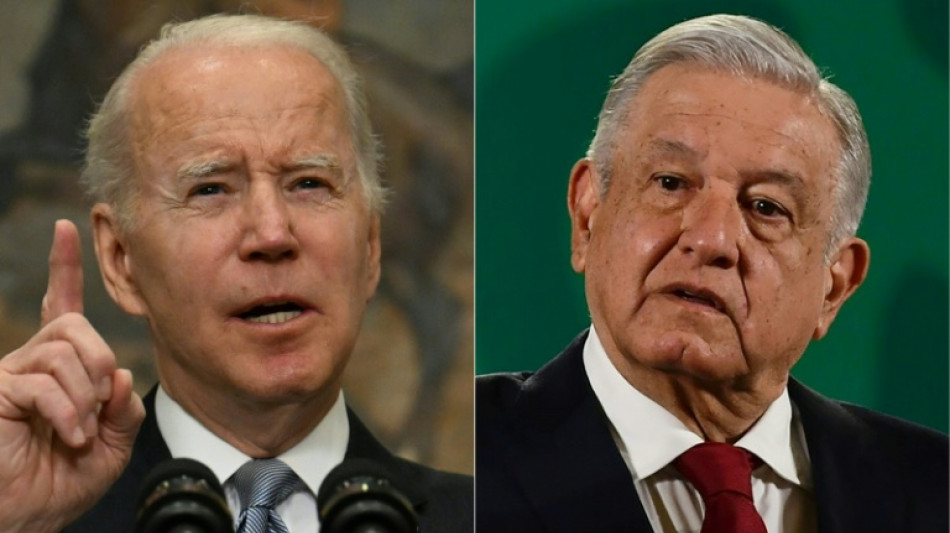

Biden, Mexican president warn of 'unprecedented' migration flow
US President Joe Biden and his Mexican counterpart Andres Manuel Lopez Obrador warned of "unprecedented" pressure from migration in a call Friday that highlighted a major political headache for the White House ahead of November elections.
"In view of the unprecedented flows of migrants from throughout the hemisphere to our two countries, the presidents reiterated the need to build stronger tools for managing regional migration surges," the White House said in a statement after the call between the two presidents.
The virtual meeting, just under an hour long, showcased Biden's attempt to steer the complex relationship onto a more cooperative basis after the tempestuous, at times tense, situation under his predecessor Donald Trump.
"The tone of the call was very constructive. This was not a call where President Biden was threatening the Mexican president in any way," White House Press Secretary Jen Psaki said, referring to Trump's aggressive brinkmanship with Mexico over illegal immigration.
The two nations are inextricably tied through trade, culture and the violent narcotics industry. However, looming over everything is the quandary of how to manage both legal and illegal migration.
It's a subject that will feature heavily at the upcoming regional Summit of the Americas in June, being hosted in Los Angeles.
"The majority of the conversation was about migration and was about continued work on coordination, on economic coordination, on taking steps to reduce migration along the border," Psaki said.
Lopez Obrador tweeted after the call that Mexican foreign minister Marcelo Ebrard will travel to Washington on Monday to discuss "issues of cooperation for development" and the Summit of the Americas.
And Lopez Obrador himself is to visit Central America and Cuba from May 5 to 9, with stops in three of the main countries where migrant caravans originate: Guatemala, El Salvador and Honduras.
The trip is unusual, as the Mexican president has made few foreign visits since taking office in 2018, although he has visited the United States three times.
A senior US official told reporters Friday that "monumental challenges" around the world, ranging from climate change to the war in Ukraine and food insecurity, are prompting "unprecedented levels of migration."
- Looming surge -
The already messy situation is heating up with Biden's attempt to end Title 42, a rule instituted during the Covid pandemic as a way to quickly expel migrants and asylum seekers, rather than let them stay in the United States while their cases are heard.
Opponents see the rule as no longer justified, but Republicans and even some of Biden's own party warn that lifting the measure will trigger an uncontrolled surge across the border. Although the rule was set to expire May 23, a court order means it remains in place for now.
With Biden's Democrats potentially facing heavy defeats in November midterm congressional elections, the issue will only intensify.
Both sides of the political divide in Washington agree there's a problem.
The White House talks of a "broken" immigration system that Congress should fix, while Republicans accuse Biden of failing to protect the country's southern frontier.
US Customs and Border Protection registered 7,800 undocumented migrants a day along the southwest border in the past three weeks -- almost five times the average of 1,600 recorded from 2014-2019, before the coronavirus outbreak.
But where Trump made political capital with a project to reinforce barriers and walls along the border, as well as threatening trade tariffs on Mexico, the Biden administration is doubling down on its theory that only a more complex, collaborative approach can work.
"Given our shared border, we must do this together -- and as a region," the US official said, referring to the challenge of managing the expected surge should Title 42 be lifted.
The phrase most often heard from the Biden White House when explaining its approach to the migration problem is "root causes" -- a reference to economic, security, political and increasingly climate strains driving people out of poorer countries to the south.
"We have many challenges before us, but we can tackle them better when we work in partnership," the official said. "What I will say is that the mechanisms for cooperation with Mexico had not been functioning during the previous administration."
R.Andazola--LGdM




